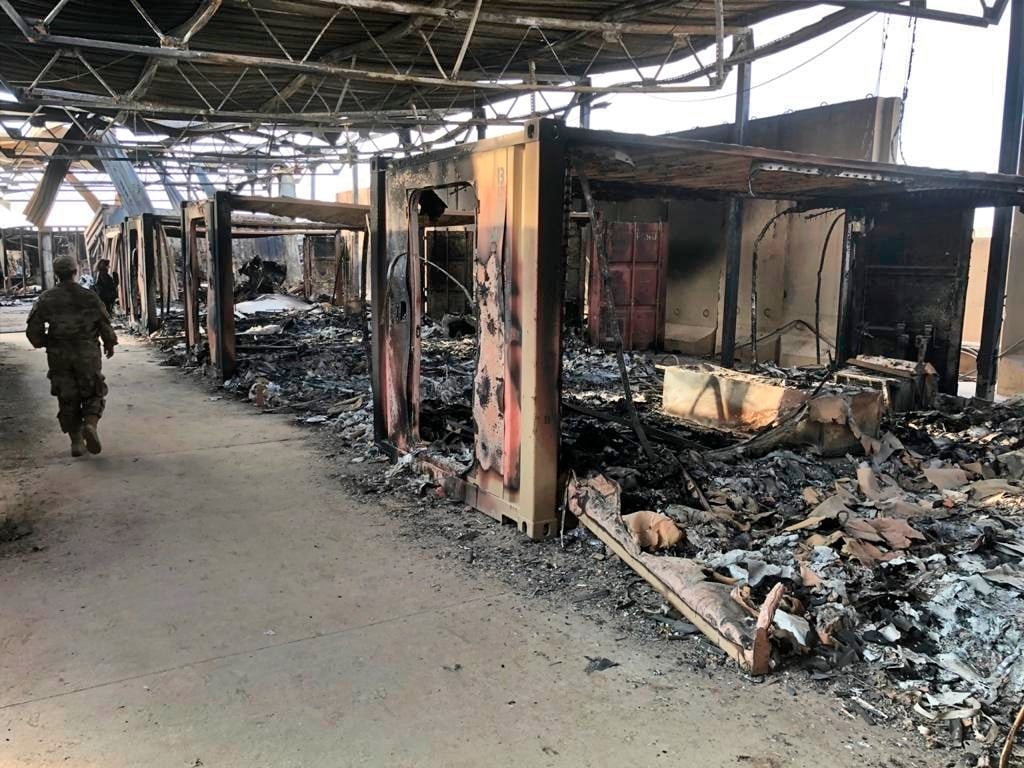There will be Purple Hearts awarded to troops injured during the Jan. 8 Iranian missile barrage on the al-Asad airbase in Iraq, a defense official told Military Times.
In the weeks following the attack, 110 troops were eventually diagnosed with mild traumatic brain injuries in Tehran’s attack targeting the airbase — where roughly 1,000 U.S. troops are stationed. The barrage was in response to a U.S. airstrike that killed Iran’s Quds Force Commander Qassem Soleimani on Jan. 3.
CNN’s Barbara Starr first reported that the Purple Hearts would be awarded, saying that “dozens of troops” are expected to receive them.
It’s unclear at the moment how many troops will receive the Purple Hearts. The defense official told Military Times that the medal award packets are still going through the approval process.
A Pentagon spokeswoman said the award submissions are under review.
“The Purple Heart submissions remain under review and are being processed in accordance with Defense Department and military service regulations," Jessica Maxwell, a Pentagon spokeswoman, told Military Times in an email. “Upon completion, service members entitled to receive the Purple Heart will be notified by their leadership.”
In 2011, the Pentagon streamlined its policy regarding criteria for the Purple Heart to allow service members with mild TBI to be eligible for the award even if they did not lose consciousness in the attack or were not immediately treated on scene by a medical officer.
RELATED

The Army says the Purple Heart can be awarded for mild TBI “or concussive severe enough to cause either loss of consciousness or restriction from full duty due to persistent signs, symptoms, or clinical finding, or impaired brain functions for a period greater than 48 hours from the time of the concussive incident.”
The Army further clarifies that examples of medical treatment for a concussion that meets the standard for the Purple Heart includes, referral to neurologist or neuropsychologist, physical or occupational therapy, or restriction from duty for a period greater than 48 hours.
“Combat theater and unit command policies mandating rest periods or “down time” following incidents do not constitute qualifying treatment for concussion injuries. To qualify as medical treatment, this rest period must have been directed by a medical officer or medical professional for the individual after diagnosis of an injury as indicated,” the Army’s Purple Heart policy states.
The Air Force also includes a 48 hour loss of work requirement for airmen diagnosed with TBI or a concussion, according to the Air Force awards manual.
“When considering award of the Purple Heart for a mild traumatic brain injury or concussion that did not result in the loss of consciousness, ensure the diagnosed mild traumatic brain injury resulted in a disposition of ‘not fit for full duty’ by a medical officer for a period of greater than 48 hours based on persistent signs, symptoms, or findings of functional impairment resulting from the concussive event,” the Air Force awards manual detailed.
“Sailors and Marines may be awarded the Purple Heart for certain mild traumatic brain injuries that were caused by enemy action” Jim Nierle, president, Navy Department Board of Decorations and Medals, said in a 2011 news release.
“If they suffered a loss of consciousness, or had to be given the disposition of ‘not fit for full duty’ by a medical officer for a period greater than 48 hours after a concussive event, they may qualify for the Purple Heart," Nierle explained in the release.
The Purple Heart is also awarded to sailors and Marines who lose consciousness as a result of a mild TBI or concussion.
According to CNN, three defense officials described the situation as extremely sensitive because of the attention the issue received after President Donald Trump downplayed the significance of the injuries. With the Purple Hearts pending, the awards are getting internal attention from senior Pentagon personnel, according to the defense officials. It is not clear how much the Defense Department will publicize the awards when they are made, officials said.
When the first reports about the injuries emerged, Trump said he didn’t consider potential brain injuries to be as serious as physical combat wounds.
Secretary of Defense Mark Esper initially said that more than 10 ballistic missiles hit al-Asad during the strike, damaging tentage, a parking lot and other equipment. He characterized the aftermath as nothing “major” at the time.
Even so, Army Gen. Mark Milley, chairman of the Joint Chiefs of Staff, predicted that Iran’s intent was to kill Americans on Jan. 8, and later disclosed Iran’s missiles were lethal 1,000- to 2,000-pound munitions.
“These things have bursting radiuses of 50 to 100 feet, and that’s just the shrapnel in the actual blast. These are very, very significant, serious weapons,” Milley said Jan 30.
“And you know, if you’re within a certain range of that thing, there’s no helmet or anything else that’s going to save you,” Milley added.
Howard Altman is an award-winning editor and reporter who was previously the military reporter for the Tampa Bay Times and before that the Tampa Tribune, where he covered USCENTCOM, USSOCOM and SOF writ large among many other topics.
Shawn Snow is the senior reporter for Marine Corps Times and a Marine Corps veteran.
Meghann Myers is the Pentagon bureau chief at Military Times. She covers operations, policy, personnel, leadership and other issues affecting service members.



